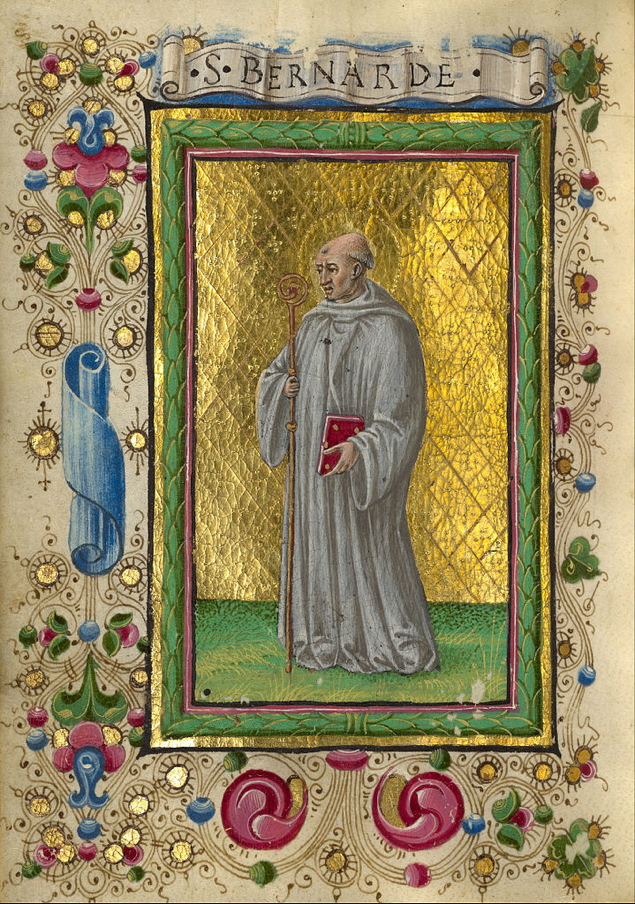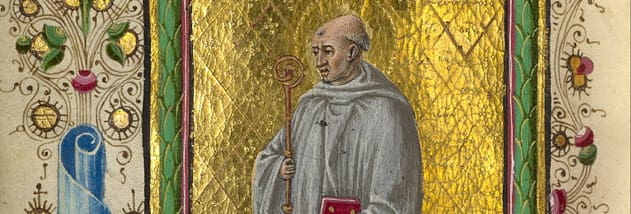 At the end of his treatise on contemplation (also known as his treatise On Consideration), Saint Bernard of Clairvaux observes the dimensions of Christian mental prayer. Specifically, when Saint Paul prays in Ephesians 3:18 that we might come to comprehend and be filled with the breadth and length, height and depth of the fullness of God revealed in the love of Christ, Saint Bernard sees four kinds of contemplation.
At the end of his treatise on contemplation (also known as his treatise On Consideration), Saint Bernard of Clairvaux observes the dimensions of Christian mental prayer. Specifically, when Saint Paul prays in Ephesians 3:18 that we might come to comprehend and be filled with the breadth and length, height and depth of the fullness of God revealed in the love of Christ, Saint Bernard sees four kinds of contemplation.
For Saint Bernard, God’s breadth is His eternity, His promises. His length is His love, His works. His height is His power, His majesty. His depth is His wisdom, His judgments. Bernard goes on to teach that our meditation on the promises by faith covers the eternal length of God, Himself; our remembrance of all His blessings is a contemplation of the breadth encompassed by the Trinitarian mystery; contemplation of the Lord’s majesty is a glimpse of the heights Divinity; and that our examination of divine judgments gazes on the very depths of the Invisible God. Christ’s sacrifice of Himself on the Cross reveals this whole mystery Saint Bernard describes and makes it accessible to us in such a way that it can fill our whole being to the point at which love transforms our whole existence through prayer.
When Saint Bernard dwells on these “kinds” of contemplation, he is free from the psychological subjectivism that trumps most discussions on prayer today. This experienced based discussion inverts the discussion on prayer away from God Himself and onto the accomplishments or achievements of the person who prays. No longer aware of the object of our contemplation, the conversation gets lost in outcomes and results. Ink is wasted, not on the Mystery that Saint Paul and Saint Bernard invite us to glimpse, but instead on breaking through into new kinds of consciousness.
When we are not free from subjectivism, from an experience oriented approach to prayer, it is easy to be entrapped. That is to say, if we are not careful, we might never escape the gravity of our own big fat ego.
This is why those seeking a new state of consciousness do not need sacred doctrine – they do not need to be guided by the shining brilliance God has revealed because they satisfy themselves on that which cannot truly salvifically illumine the labyrinth of their hearts. To see the truth about ourselves and about God, we need a light that is not our own, that shines above us, that is a gift humbly received. We must not be naive in regard to the power our own pride to project what it thinks it understands about God onto itself, and vice versa. Lucifer was fascinated with his own light in this way to his own peril. This is a deadly trap of self-deception.
Against this contemporary tendency, Saint Bernard does not describe states of consciousness or methods of meditation when he offers his four kinds of contemplation. He is completely focused on the mystery that the prayer of faith clings to, the splendor that it strains to see. He refers to good fruit that the heights and depths and horizons produce in the soul. He is aware that the contemplation of these things is truly salvific. Yet, everything he presents as the effects of the contemplation points back to the wonders it beholds. It is about communion, relationship – not merely enlightenment and consciousness. It is to this end, to the ultimate end of the whole divine economy, that Saint Bernard has the freedom of heart to distinguish contemplative prayer in terms of what not only should be discussed but what should also be sought out with every effort of our heart: the works, the promises, the majesty, the wisdom of the One who loved us to the end.
+
Art for this post on Saint Bernard’s Four Kinds of contemplation: Saint Bernard, about 1469, Taddeo Crivelli, PD-US author’s life plus 100 years or less, published in the U.S. prior to January 1, 1923, Wikimedia Commons.
Dan’s Note: For more of Anthony’s insights on prayer, don’t miss his book, Hidden Mountain Secret Garden, an experience like no other. Anthony has an unusually profound understanding of mystical theology and lives a life of deep prayer. Among his many accomplishments and responsibilities, Dr. Lilles now teaches theology for the Avila Institute.





